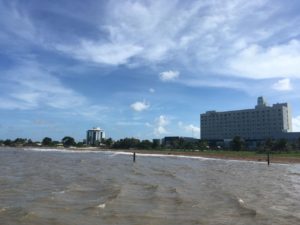Dr. Rao arrives in Guyana
 I’m halfway through my two-week stay in Georgetown, Guyana. I’ve seen a lot, I’ve learnt a lot, and even though I haven’t accomplished everything I wanted to, I’ve done a lot too. I’m working with the Department of Anesthesia at Georgetown Public Hospital Corporation, the major referral centre and teaching hospital for all of Guyana. There are five main operating rooms and two maternity rooms. The Department has ten anesthesiologists, including Dr. Hendricks, the first anesthesiologist to have graduated from the GPHC Anesthesia Residency Training Program, and eleven residents. There are also several nurse anesthetists and their trainees. So, there are a lot of people at the head of the bed during every induction!
I’m halfway through my two-week stay in Georgetown, Guyana. I’ve seen a lot, I’ve learnt a lot, and even though I haven’t accomplished everything I wanted to, I’ve done a lot too. I’m working with the Department of Anesthesia at Georgetown Public Hospital Corporation, the major referral centre and teaching hospital for all of Guyana. There are five main operating rooms and two maternity rooms. The Department has ten anesthesiologists, including Dr. Hendricks, the first anesthesiologist to have graduated from the GPHC Anesthesia Residency Training Program, and eleven residents. There are also several nurse anesthetists and their trainees. So, there are a lot of people at the head of the bed during every induction!
The teaching plan that Dr. Harvey, the Anesthesia residency program director, and I made was that I would teach around regional anesthesia in the OR and do practice oral exam sessions with the senior residents. The department has worked with volunteers from the Canadian Anesthesia Society International Education Foundation (CASIEF) and from the American Society of Anesthesiologists to develop ultrasound and peripheral nerve block skills. This week we built on those skills by discussing how to safely prepare for a procedure, how to treat potential complications, and the logistics of performing nerve blocks in and out of the OR.
Outside of the OR, I spent an hour in the morning teaching the second-year residents during their physiology block, and an hour in the afternoons doing oral exam preparation with the two fourth-year residents. Both the senior residents have spent four months with the Department of Anesthesia at McMaster University in Hamilton as part of their training and they both tell me it was an incredibly valuable experience. What a great way for a Canadian university to support the GPHC program!
 While I was in the OR I watched the consultants, senior residents, and junior residents working together. I noticed that even though there was usually a consultant or senior present, they weren’t necessarily supervising in a way that allowed the junior learner an opportunity to take ownership of their case, troubleshoot during complications, or understand why they were doing what they were doing. Both the consultants and the senior residents expressed that they didn’t always know how to teach effectively. Which is why I am so excited for the coming week!
While I was in the OR I watched the consultants, senior residents, and junior residents working together. I noticed that even though there was usually a consultant or senior present, they weren’t necessarily supervising in a way that allowed the junior learner an opportunity to take ownership of their case, troubleshoot during complications, or understand why they were doing what they were doing. Both the consultants and the senior residents expressed that they didn’t always know how to teach effectively. Which is why I am so excited for the coming week!
Next week I, along with three of my colleagues from Canada will be running a teaching skills course called Inspire Through Clinical Teaching. Four days, 5 workshops, 29 physicians and nurses from 6 different specialties all coming together to learn how to teach.

